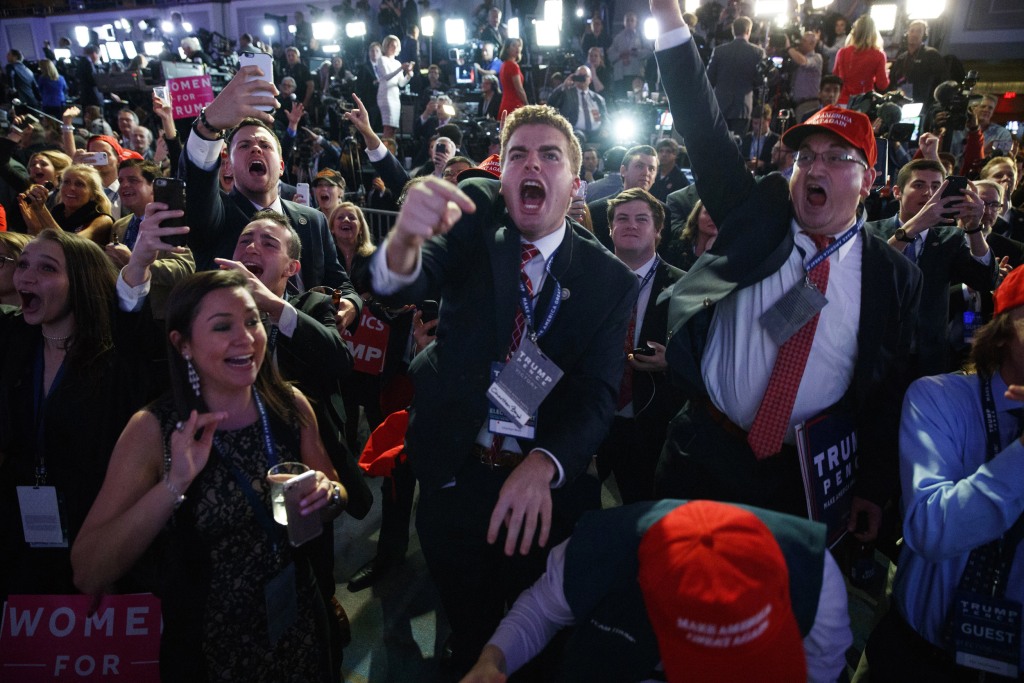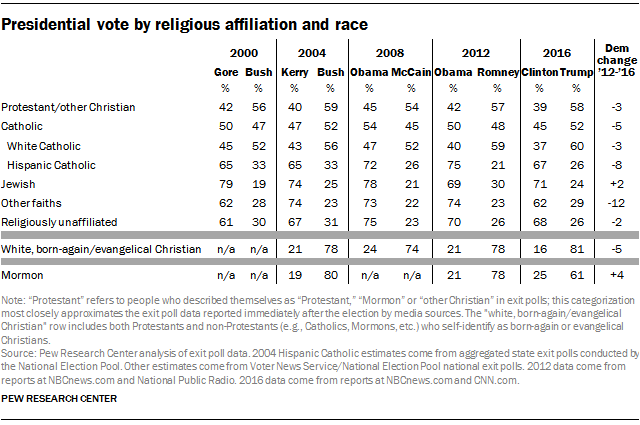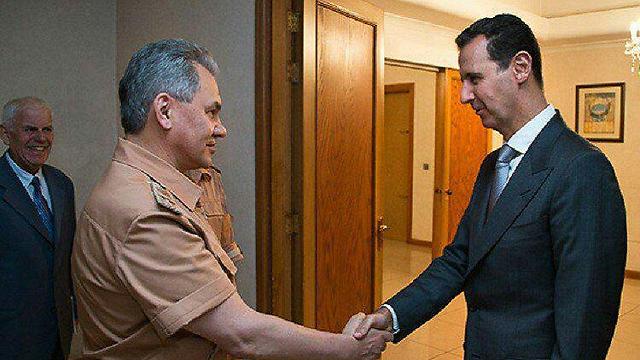ISIL delighted by Trump’s victory
In this posting: a table and note from postings editor, articles from Christianity Today and Ynet analysing the election result.

Supporters of Donald Trump cheer as they watch election returns during an election night rally in New York. Photo by Evan Vucci / AP

JfJfP postings note
The presidential race was divided by gender (more men than women voted for Trump), race (the vote for Trump was overwhelmingly white), age (old people outstripped young in voting for Trump by a considerable margin).
The table above gives the starkest divide of all – white evangelical Christians were, proportionately, for and away the greatest Trump supporters – over 80% according to exit polls. (Evangelical Christians are the least questioning supporters of Israel amongst all religions and none.)
A lower proportion of Jews than of any other religion voted for Trump (24%). A higher proportion of Jews than of any other religion voted for Clinton (71%). Thank G-d for the Jews.
Trump Elected President, Thanks to 4 in 5 White Evangelicals
Exit polls suggest that “Never Trump” was never a likely outcome for white evangelical voters, who showed up to support President-elect Donald Trump at their highest margin since 2004.
Despite reservations expressed by many evangelical and Republican leaders, white born-again/evangelical Christians cast their ballots for the controversial real estate mogul-turned-politician at an 81 percent to 16 percent margin over Hillary Clinton.
Evangelicals of colour—who represent 2 in 5 evangelicals, but aren’t segmented out in most national political polls—largely preferred Clinton leading up to the election. But she ultimately underperformed among Hispanics and African Americans compared to President Barack Obama before her.
“The story here continues to be continuity in the strength of evangelical support for GOP candidates, rather than greater intensity,” said Kevin den Dulk, political science professor at Calvin College. “I suspect there’s some underlying changes in polling responses that would make Trump’s evangelical support seem greater than it has in the past.”
As a wave of disappointed voters announced on Twitter that Trump’s election has led them to drop the label evangelical, den Dulk speculated that evangelical believers who voted for Clinton may have been less likely to identify that way in exit polls, widening the born-again gap between the two candidates.
While Clinton’s campaign largely ignored evangelical outreach (unlike Obama), Trump spent much of the months leading up to Election Day directly courting evangelical support. Those voters—particularly in battleground states such as Ohio, North Carolina, and Florida—proved to be one of his strongest support bases. During the Obama election years, as many as a quarter of evangelicals voted Democrat; with Clinton, it was nearly 10 percentage points less than that.
“The fact of the matter is that in this race only one of the two major party candidates even pretended to care about white evangelicals,” tweeted Obama’s former faith advisor Michael Wear.
Trump gave a victory speech around 2:50 a.m., thanking his family, staff, and supporters, including previous GOP hopefuls Ben Carson and Mike Huckabee.
Vice President-elect Mike Pence said, “I come to this moment deeply humbled, grateful to God for his amazing grace.” Trump did not mention God in his remarks. He is the first president in over 30 years to not conclude his speech with “God bless America.” The Rolling Stones’ “You Can’t Always Get What You Want” played the pair off the stage at their late-night celebration.
White evangelicals made up 1 in 4 of all voters in the 2016 election. The only demographics that broke for Trump more than white evangelicals were Republican men (90%), Republican women (89%), and conservatives (81%).
Americans who attend religious services weekly also favored Trump, but by a narrower 56 percent to 40 percent margin over Clinton. Monthly worshipers also broke for Trump more narrowly, 49 percent to 46 percent.
Exit polls also indicated that Trump swung the Catholic vote back to the GOP by a 52 percent to 45 percent margin, after a majority of Catholics sided with Obama in the previous two elections.
Trump and Clinton proved a contentious pair from the start—more evangelical voters planned their pick out of distaste for the other candidate than out of enthusiastic support for their choice, according to the Pew Research Center. As of October 25:
- 45% of white evangelical Trump supporters were voting for Trump
- 51% were voting against Clinton
Pew also found that:
- 41% of white evangelicals thought Trump was “a good role model”
- 55% thought he was “hard to like”
- 58% thought he was well-qualified
- 67% thought he was honest
“I have many friends and loved ones who made the decision to cast a mournful vote for the GOP nominee,” said Denny Burk, professor at Southern Baptist Theological Seminary’s Boyce College. “They have no illusions about what the GOP nominee is… I disagree with their decision, but I understand and respect them.”
Among evangelicals, some speculated that Trump’s shaky background on pro-life issues, awkward articulation of his personal faith, and reputation around womenwould turn away conservative Christians. But party loyalty outweighed those concerns.
Among voters overall, Trump won the plurality of voters (39%) who most wanted a president who “can bring change” (83% vs. 14%), while Clinton won the rest of voters who most wanted a president who “cares about me” (53% vs. 42%), has the “right experience” (90% vs. 8%), or “good judgment” (66% vs. 26%).
“Dear white conservative evangelicals, the Trump victory proves that the GOP doesn’t need your consensus approval. Politics as change failed,” tweeted King’s College professor Anthony Bradley, who suggested the results reflect lower class voters’ reactions to being ignored and mocked by political elites.
Despite a lukewarm reception among many evangelical leaders polled by the National Association of Evangelicals and World magazine, prominent names including James Dobson, Jerry Falwell Jr., and Eric Metaxas continued to back him.
“We are going to see continuing rifts among evangelical leaders in the coming years, and much of the debate will be about how to respond as Christians to the many challenges of pluralism in American public life,” said den Dulk.
In the runup to Election Day, CT noted the Top 10 stats explaining the evangelical vote.

With apologies – a cartoon from No more Islam in the USA, Facebook, a group which, along with the Klu Klux Klan, are Trump enthusiasts.
Donald Trump’s presidential election victory means he is the man Washington’s Arab allies must deal with after his January inauguration, as they seek US help to end wars from Syria to Mosul, manage humanitarian crises and provide jobs for their populations at a time of low oil prices.
Trump’s campaign tirades against Muslim migrants—the target of Prince Alwaleed bin Talal’s comments on Twitter—and against Arab allies who don’t “pay” for US support suggest the relationship could be delicate. How far Trump the president will differ from Trump the polarising election candidate is not clear.
Brief, congratulatory messages flowed quickly from Arab allies, including one from Saudi King Salman bin Abdulaziz, who wished Trump success in “achieving security and stability in the Middle East and the wider world”.
But underneath the protocol, for many Arab rulers and royals Trump’s victory is a source of anxiety. They now face a new America led by Trump who, they fear, could upend a regional order that has prevailed for decades.
Some Arabs like Trump’s no-nonsense style, and praise what they see as his capacity for tough leadership.
“A strong leader … that is what is needed here in the Middle East and all across the world,” said Ali al-Muhannadi, 57, a Qatari owner of an electrical company, filling his car up at a petrol station in Doha on Wednesday.
Muhannadi saw Trump as a useful ally in confronting the jihadist threat, saying he is “very frank and not like a politician. Islamist radicals are bad for the West and for us too”.
But privately there are concerns about a lack of clarity in Trump’s policies for the world’s most combustible region as it struggles to break free from war while trying to safeguard the free flow of its oil exports.
Disaffected Arab youth
In particular there are worries that Trump’s hostile rhetoric towards Muslim migrants will play into the hands of ISIS and al Qaeda, which are eager to recruit disaffected young Arabs to wage war on the regional governments they despise as stooges of Washington.
Gulf Arab leaders want a US president who understands their concerns after eight years of what they regard as diffidence under US President Barack Obama, someone who did not provide the kind of personal contact they value. In particular they want help to push back against Iran, their main rival. But they fear Trump’s public praise for Vladimir Putin will encourage Russia to expand its support for Syrian President Bashar al-Assad, an ally of Iran and an enemy of most Gulf Arab states.

Russian Minister of Defence Sergey Shoigu meets with President Assad, June 2016. Photo by Vadim Savitsky/ Russian Defence Ministry Press Service pool photo via AP
Apart from a commitment to Israel’s security, a constant in US foreign policy, and an isolationist tone to his comments, much in Trump’s statements about the region remains vague and poorly thought out, diplomats and analysts say.
Opinion is divided about whether Trump’s remarks on the campaign trail will be enacted when in office. Among these is his comment that he would consider halting US purchases of Saudi oil unless Riyadh provides troops to fight Islamic State.
Faisal Al Yafai, a commentator at The National newspaper, said many people thought Trump had used his extravagant comments to win votes and once in office he would mellow.
“That sort of stuff doesn’t help confidence. That collapse of confidence between the US and its allies has a knock-on impact on the economies and in the decisions those countries take on a political level.”
Yafai, whose newspaper is based in the United Arab Emirates, noted Iraqis were putting their lives on the line to regain Mosul, ISIS’s main stronghold in the country. “That is not just a war for the region, it is a war for the world,” he said.
Others are more sanguine.
A senior Turkish official predicted continued strong relations with the United States and argued that “Comments in an election period always have a harder and more hawkish tone than is necessary. But they remain peculiar to the election period.”
Saudis ‘ready to take a risk’
Trump’s remarks have been combative, and eye-catching. He has said the United States should be reimbursed by the countries it provides protection for.
Without America, “Saudi Arabia wouldn’t exist for very long,” Trump told the New York Times in March.
Trump’s win drew a cautious welcome in Syria, which has entered its fifth year of war between rebels and Assad’s forces.
In Damascus, Syrian member of parliament Sherif Shehada said US policy could shift Assad’s way. “We must be optimistic, but cautiously optimistic,” Shehada said.

Saudi naval exercises utilizing US weapons
Trump’s statements on Syria, and his more open-minded stance towards Assad’s ally Russia, have fuelled rebel concern about the policy he may adopt on the conflict, in which the Russian air force has been bombing insurgents.
But beyond all that, many officials and observers see another ominous consequence.
Trump’s win has not only delighted Western right-wingers but also jihadists who told supporters the election had revealed the true position of the United States towards Muslims.
“The masks have slipped,” one supporter said on Islamic State websites. “(Trump’s) moronic declarations alone serve us even if his decisions will be under the supervision of the Senate…,” wrote another.
